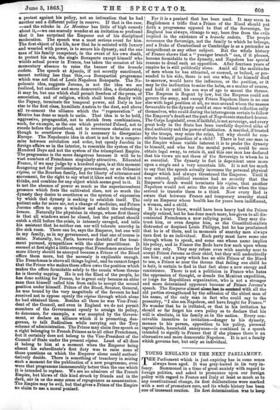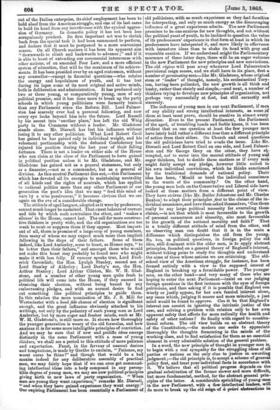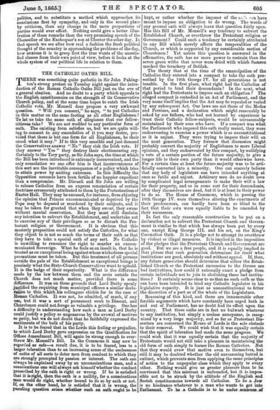YOUNG ENGLAND IN THE NEXT PARLIAMENT.
THE Parliament which is just expiring has in some sense always been aged. It was grey-haired in its very in- fancy. Summoned in a time of great anxiety with regard to foreign politics, and asked to pronounce upon our foreign policy with regard to France and Italy at least as much as to any constitutional change, its first deliberations were marked with a sort of premature care, and its whole history has been one of incessant caution. Its first determination was to keep out of the Italian enterprise, its chief employment has been to hold aloof from the American struggle, and one of its last cares to hold its hand from any interference with the cynical aggres- sion of Germany. In domestic policy it has not been less scrupulously prudent. Its first important act was to shrink back from the special task it hair been summoned to perform, and declare that it must be postponed to a more convenient season. On all Church matters it has been its apparent aim " downwards to climb and backwards to advance ;" and if it is able to boast of extending our commercial intercourse with other nations, of an amended Poor Law, and a more efficient system of education, that will be the maximum of its achieve- ments. It has been presided over by an aged statesman, without any counsellor—except in financial questions—who retains the energy and hopefulness of youth, and it has lost during its lapse some of its most original and active minds, both in deliberation and administration. It has produced only two or three young, or comparatively young, men of any political promise, and it has done more to break up the party schools in which young politicians were formerly trained than any Parliament since the Reform Bill. Lord Palmer- ston has scarcely ever had a personal following, and now every eye looks beyond him into the future. Lord Russell by his ascent into another place,' has left the old Whig party in the Commons without .a leader. Mr. Gladstone stands alone. Mr. Disraeli has lost his influence without losing it to any other politician. What Lord Robert Cecil has gained he has gained only in individual weight, and his vehement partizanship with the defeated Confederacy has injured his position during the last year of their falling fortunes. There is not a leader on either side of the House who can claim at the close of the Parliament to have gained in political position unless it be Mr. Gladstone, and Mr. Gladstone has gained not as a general statesman, but only as a financier,—not as a commander, but as a general of division. As this neutral Parliament dies out,—this Parliament which has devoted all its energies to maintaining neutrality of all kinds and the rights of neutrals, which has applied to national politics more than any other Parliament of our generation the poet's idea that we may " feed this mind of ours by a wise passiveness," it becomes obvious that we are again on the eve of a considerable change. The attitude of aged languor, adopted as it were by preference, cannot much longer be sustained. That exaet, balance of current and tide by which each neutralizes the other, .and makes a silence' in the House, cannot last. The call for more construc tive thinkers is pretty wide, and the old organizations are too weak to snub or suppress them if they appear. Most import- ant of all, there is promise of a large crop of young members, from many of whom we may expect much more than implicit following in the Steps of their fathers. Some of them indeed, like Lord A mberley, seem to boast, as Homer says, " to be better than their fathers," and amongst those who would not make this boast may probably be found men who might make it with less folly. If rumour speaks true, Lord Fred- erick Cavendish; the Hon. Lyulph Stanley, second son of Lord Stanley of Alderley ; Lord Derby's son, the Hon. Arthur Stanley ; Lord Arthur Clinton, Mr. W. H. Glad- stone, and a number of other young men quite fresh to political life will come into the House, if they succeed in obtaining their election, without being bound by any embarrassing pledges, and with an earnest desire to find out something like political principles to guide them. In this relation the mere nomination of Mr. J. S. Mill for Westminster with a bond fide chance of election is significant enough, and the .great influence obviously attached to his writings, not only by the pedantry of such young men as Lord Amberley, but by more eager and fresher minds, such as Mr. W. H. Gladstone's, is still more so. It shows how thoroughly the younger generation is weary of the old formulas, and how anxious it is for some more intelligible principles of conviction. And we may be sure that if new and prolific ideas emerge distinctly in the same Parliament with a mass of young thinkers, we shall see a period to this attitude of mere patience and expectation. Faust, in the fervour of nascent desires and temptations, is made by Goethe to exclaim, " Patience, my worst curse be thine !" and though that would be a bad maxim indeed for any deliberative assembly of practical men, we may fairly hope that if we can once get command- ing intellectual ideas into a body composed in any percep- tible degree of young men, we may see new political principles giving birth to new laws of party organization. " When men are young they want experience," remarks Mr. Disraeli, " and when they have gained experience they want energy." Our expiring Parliament has been essentially a Parliament of
old politicians, with as much experience as they had faculties for interpreting, and only as much.energy as the discouraging influence of a great experience admits. The new Parliament promises to be one anxious for new thoughts, and not without the political yeast of youth, to be inclined to question the value of its predecessors' experience in that form at least in which its predecessors have interpreted it, and more likely to effervesce with immature ideas than to shake its head with grey and venerable caution. If we understand aright the Parliamentary murmurs of these latter days, there will be an eager welcome in the new Parliament for new principles and new convictions.
The old rigime will pass away whenever Lord Palmerston's, provisional reign ceases, and we shall have in its place, first a.
number of germinating men—like Mr. Gladstone, whose original stem or leader' of thought, namely, his ecclesiastical Tory- ism, having been pollarded, the new growth is all thick and bushy, rather than stately and simple,—and next, a number of thinkers trying_to develope new principles of organization, not perhaps very successfully at first, but still earnestly and sincerely.
The influence of young men in our next Parliament, if men of any ability and strong intellectual interests, as some uf them at least must prove, should be creative in almost every direction. Even in the present Parliament, the Parliament of the aged, of trembling hands and feeble knees, it has been evident that on one question at least the few younger men have lately hold rather a different tone than a different principle of action from their elders. On Church and creed questions. the old politicians have tried to evade the issue. Like Mr. Disraeli and Lord Robert Cecil on one side, and Lord Palmer- ston and Sir George Grey on the other, they have at} tempted, not to enter into the mental attitude of young anti eager thinkers, but to decide these matters as if every mail might fairly accept any pledge, however little suited to his own individual convictions, which he thinks sanctioned by the traditional demands of national policy. Their idea has been, Mould or bend the individual conscience to the wants of the community' On the other hand, the young men both on the Conservative and Liberal side have looked at these matters from a different point of view. They have striven (like Mr. Butler. Johnstone and Mr. Charles Buxton) to adapt their principles first to the claims of the in- dividual conscience, and have then asked themselves, Can there really be any large political necessity for overruling these claims,—is not that which is most favourable to the growth of .personal earnestness and sincerity, also moat favourable to the growth of the national morality and faith?' That is a totally different attitude of mind from the other, and no observing man can doubt that it is in the main a difference which distinguishes the old from the young. So, too, on political questions, in foreign policy the old idea, still dominant with the older men, is to apply abstract principles, founded on a general theory of England's interest, without taking pains to study the thoughts and understand the aims of those whose actions we are criticizing. The old- school view of the American struggle, for -instance, has been formed entirely with a view to the supposed interest of England in breaking up a formidable power. The younger men, on the other hand—and very many of those who are hoping to enter the next Parliament—insist on our judging foreign questions in the first instance with the eyes of foreign politicians, and then asking if it is possible that England can wisely or justly oppose, for her own fancied interest alone, any issue which, judging it nearer and more minutely, a just mind would be found to approve. Can it be that England's interest can consist in ignoring the intrinsic justice of the case, and solving a problem with relation only to her own apparent safety that affects far more radically the health and safety of other nations ? So finally with regard to constitu- tional reform. The old view builds on an abstract theory of the Constitution,—the modern one seeks to appreciate thoroughly the thoughts fermenting in the •minds of the working class, and to find satisfaction for them as an essential element in every admissible solution of the general problem. In a word, the new principle of thought in younger men is, to begin with a real sympathy for the struggling ideas of all parties or nations as the only clue to justice in awarding judgment ;—the old principle is, to accept a scheme of ,general policy first, and treat your individual facts in accordance with it. We believe that all political progress depends on the gradual substitution of the former slower and more difficult, but more fundamental, method, for the abstract general prin- ciples of the latter. A considerable sprinkling of young men in the new Parliament, with a -few intellectual leaders, will do more to break up the old reign of a priori abstractions in politico, and to substitute a method which approaches its conclusions first by sympathy, and only in the second place by criticism, than any change in the mere proportions of parties would ever effect. Nothing could give a better illus- tration of these remarks than the very promising speech of the Chancellor of the Exchequer's son at Chester the other day. In that speech we see after how real a fashion the fresh political thought of the country is approaching the problems of the day, how anxious it is to grasp first the true wants of the unsatis- fied classes from their own point of view, before it looks at the whole system of our political life in relation to them.
































 Previous page
Previous page